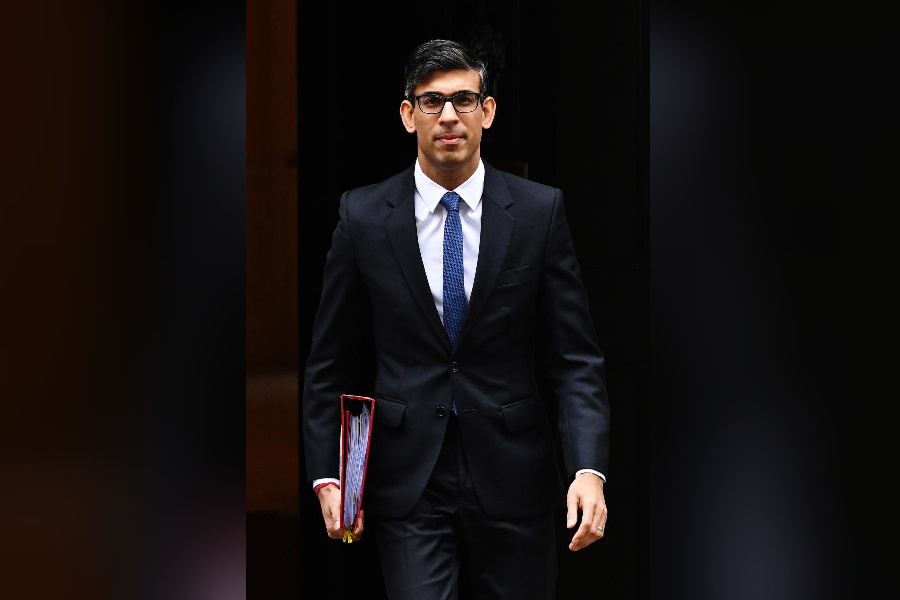Meteoric rise
Lord Michael Ashcroft, a former treasurer and deputy chairman of the Conservative Party, had written the first biography of Rishi Sunak and is about to bring out its sequel. Going for Broke: The Rise of Rishi Sunak came out in November 2020 when Rishi was the chancellor of the exchequer appointed by Boris Johnson. At the time, Ashcroft told me: “At the beginning of the year hardly anyone outside Westminster and Yorkshire had heard of Rishi Sunak — then all of a sudden he was one of the most powerful and influential figures in a government facing a national crisis. I thought people would be interested to know more about him and how he achieved such a meteoric rise.”
In October last year, Rishi was ‘crowned’ prime minister by fellow Tory members of Parliament after they had ousted Johnson and Liz Truss crashed the economy during her 43 days in power. Current opinion polls, though, give Labour a 20-25% lead and suggest that Keir Starmer will become PM after next year’s general election.
Maybe on the plane to Delhi for the G20 summit in September, Sunak will be able to get hold of an early copy of Ashcroft’s sequel, All to Play For: The Advance of Rishi Sunak. Ashcroft now says: “The speed of Rishi’s advance to 10 Downing Street is without precedent in modern British politics. Aged forty-two, he was Britain’s youngest prime minister in more than 200 years. All to Play For shows what makes him tick ahead of a general election whose outcome will have profound consequences for Britain.”
Golden voice
Many Indians in the United Kingdom still remember Lata Mangeshkar’s first live concert in London at the Royal Albert Hall in 1974. Last week, English musicians from the Birmingham Symphony Orchestra, who don’t understand a word of Hindi, were magnificent as they accompanied Palak and Palash Muchhal who sang many of Mangeshkar’s golden oldies, which included “Pyar kiya toh darna kya”, “Kabhi kabhie”, “Chalte chalte yunhi koi”, “Pyar hua iqraar hua”, “Tujhe dekha toh yeh jana sanam” and “Kabhi khushi kabhie gham” but missed out on my favourite, “Dil hoom hoom kare”.
The Royal Albert Hall was packed with Indians travelling down memory lane. First generation Indian immigrants had Hindi film songs in the background when their children were growing up. Will these songs have the same appeal for the third, fourth and subsequent generations? Mangeshkar’s memorable melodies provide the golden thread that ties the Indian diaspora across the world.
Harrowing journey
A seminar at Cambridge University discussed a book called Coolie Woman: The Odyssey of Indenture by Gaiutra Bahadur, who was born in Guyana in 1975. She emigrated to the United States of America at age six and is now an associate professor of arts, culture and media at Rutgers University.
Bahadur’s great-grandmother, Sujaria, arrived in British Guiana on board The Clyde on November 4, 1903. She was travelling alone while four months pregnant. Bahadur’s book has used Sujaria’s harrowing experiences to tell a much wider story. The Guyana-born David Dabydeen, a novelist and honorary fellow at Selwyn College, Cambridge, told me: “Between 1838 and 1920, 2.1 million Indians from Bihar and UP left — invariably through Calcutta port — for the Caribbean, for Mauritius, for Fiji, South Africa, Guyana and Trinidad to work as indentured labourers on plantations.” He added: “The second wave of migration was about 15-20 million people crossing the Indian Ocean to work in Malaysia, South Africa, Fiji, Uganda, Kenya, wherever the indentured had settled. So you’re talking about the largest migration of people in the 19th century.”
Bahadur is currently a visiting fellow at Selwyn College. Next year’s visiting fellow will be Mahatma Gandhi’s great-granddaughter from South Africa, Professor Uma Mesthrie, from the history department at the University of Western Cape. Cambridge is hoping to turn the five-year visiting fellowship into a permanent professorship to study indentureship.
Tales of inferno
Someone should write a play naming the people responsible for the 2010 fire in Stephen Court in Calcutta in which at least 43 people died. This thought occurred while watching Grenfell: in the words of survivors, a new play at the National Theatre. Seventy-two residents perished when the 24-storey Grenfell Tower caught fire because cheap cladding had been used illegally by contractors. The tragedy was compounded by the London Fire Brigade urging people to stay put in their apartments instead of getting out.
Footnote
A tip for those who organise literary festivals in India: they should consider the former diplomat, Simon McDonald, now the master of Christ's college, Cambridge. McDonald's book on foreign policy, Beyond Britannia, will be out in November. He revealed that he very nearly came to India as a high commissioner but was instead promoted to permanent under-secretary at the Foreign and Commonwealth Office and head of the diplomatic service. Incidentally, he doesn't think a UK-India Free Trade Agreement is imminent.

